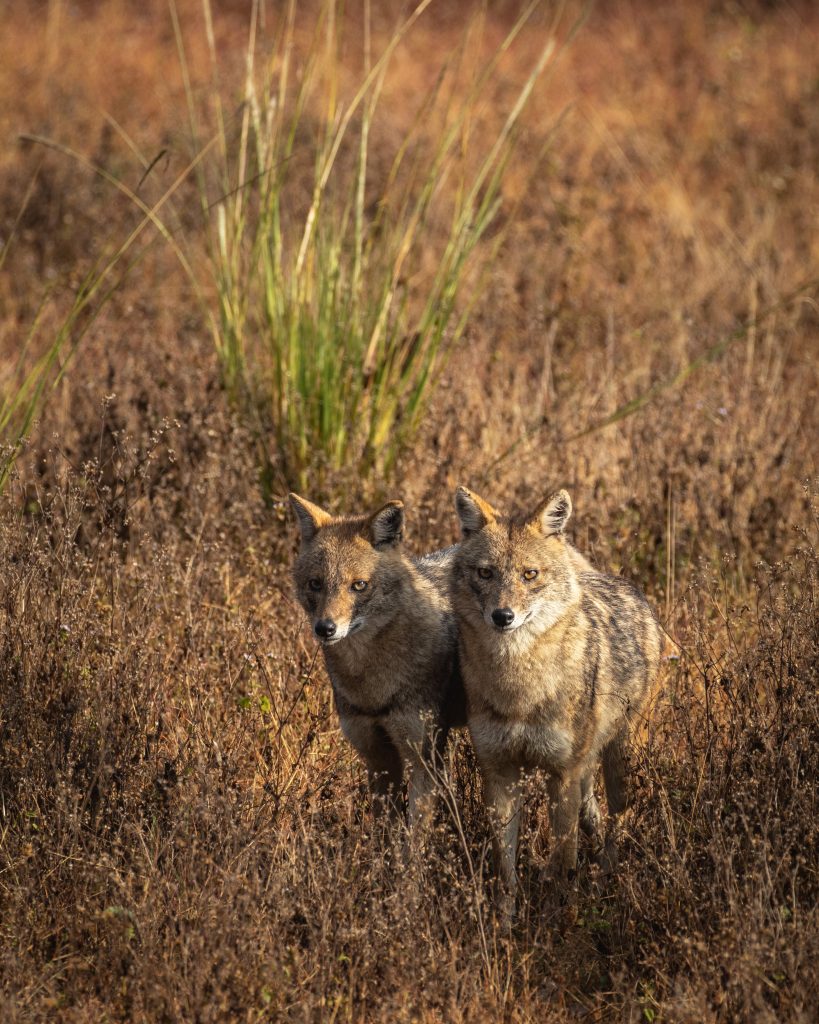The jackal (Canis aureus) is a canine native to the Middle East. It is also found in the southeastern region of Europe, where it is gradually expanding into more northern countries such as Slovakia and the Czech Republic.
The jackal is slightly larger than a fox, but smaller than a wolf. Its closest relative is the Ethiopian wolf, or African wolf. It is not closely related to the sable and striped jackals, which are found in Africa.
The weight of a jackal ranges from 7 to 10 kg depending on whether it is a male or female, with males being larger. The same is true for length, where an adult jackal reaches 70 to 84 cm, but the female is a few cm smaller. They are comparable in height at the withers, where both males and females measure around 50 cm in height.
The color of the jackal is the same for both sexes, ranging from golden yellow to sandy to gray with black spots. The fur changes significantly in the summer and winter, when it is more bushy in the winter. The individual subspecies of the jackal, of course, differ in color, especially in the distinctive dorsal stripe.
The jackal inhabits various habitats, from near watercourses, to plains, steppes and even the edges of forests. Its occurrence is always localized to a given area.
The jackal is a canine that is a direct competitor to foxes and martens. It is a carnivore, but it is also a scavenger, which can also feed on the prey of larger predators.
The jackals are social animals that form small family packs, but old males can also be loners.
The jackal digs its own burrow, or inhabits old fox burrows or old wolf dens. It all depends on the geographical location where the jackal is found.
The jackal reproduction occurs mostly in the autumn, when females are in heat and have young in the spring, which are cared for by both parents.

The jackal can be hunted all year round, just like the fox. We offer such hunting in Serbia, for example. In other countries, the hunting season may vary.
However, the suitable period starts in the summer and lasts until spring, when they start having their young. During this period, hunting is a very sensitive issue for every animal species due to the raising of young.
During the day, the best time to hunt is at dawn or dusk, or at night.
The jackal is similar to a fox, so it can be hunted using similar methods, such as stalking, stalking, or stalking through the landscape with occasional baiting or calling.
Jackals are calling by the prey they are hunting (the cry of a rabbit, the squeak of a mouse, the cry of a bird, or the cry of a hare). All of these lures work on the jackal, who responds well to them.
Another way of luring is to imitate the howling of jackals, talking in a pack, or imitating the barking of jackals. These are the sounds they most often respond to during the breeding season, which is in the fall.
Jackal hunting is not demanding on equipment. Jackals can be hunted with a shotgun at short range with a shot size of 5.1 mm and above, or with a rifle of various calibers, which are the same as for fox hunting.
Last but not least, you need good observation equipment such as binoculars, night vision or thermal imaging. The jackal is a smart animal and when luring you need to know about it before it discovers you.
There are a wide variety of callers what you can buy it, from woodpecker imitations, to hare screamers, mousetraps, and decoys that imitate their own species in a pack.
A jackal trophy is clearly its skull with fur, which is of very high quality.
We hope you found this article useful!
Your team Huntastic
© 2024 Huntastic s.r.o., all rights reserved.
This website uses cookies to improve your browsing experience. Of these, cookies are stored in your browser and are categorised as necessary for the basic functions of the site to work. We also use third party cookies to help us analyse and understand how you use this website. These cookies will only be stored in your browser with your consent. You also have the option to opt out of these cookies. But opting out of some of these cookies may affect your browsing experience.
